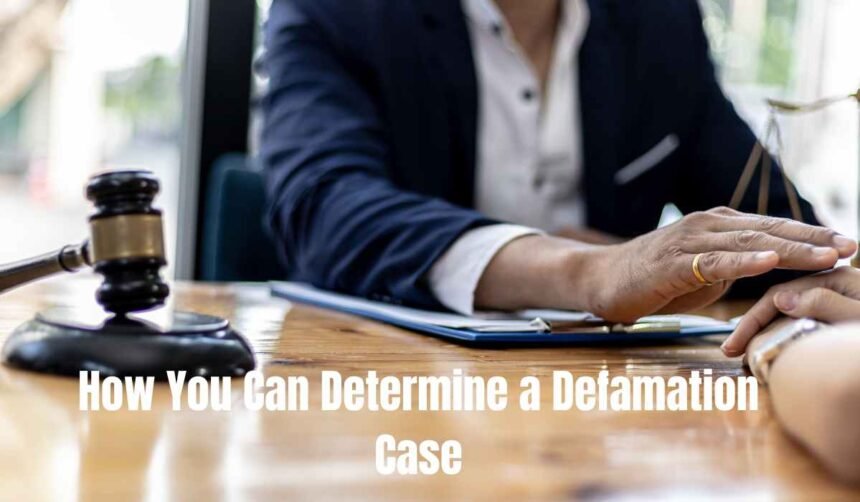An in-depth examination of the facts, the law, and the context of the claimed defamation is necessary to determine whether you have a viable defamation case. Making false claims about someone in order to damage their reputation is known as defamation.
Defamation cases are complex, and many aspects must be weighed to establish whether or not they have merit. In this in-depth post, we’ll look at what constitutes a defamation case, how its legitimacy is determined, and what results may be obtained.
What is Defamation?
To legally defame someone means to make false remarks about them, whether in writing or verbally. Two different manifestations are possible:
- Libel: This refers to defamation in written or printed form, such as articles, social media posts, or emails.
- Slander: Slander pertains to spoken defamation, which occurs through verbal statements made in conversations, interviews, or speeches.
To establish a valid defamation case, certain elements must be proven:
- False Statement: It’s clear that this claim can’t be true. Defamation claims can never succeed if the defendant is telling the truth.
- Publication: The untruthful statement must be shared with someone other than the two people involved.
- Identification: The comment in question must either directly or indirectly refer to the defamation plaintiff.
- Harm to Reputation: The plaintiff must have suffered actual damages, including financial losses or emotional distress, as a direct result of the false statement’s impact on his or her reputation.
- Fault: In some situations, the plaintiff has the burden of proving that the defendant was either negligent or behaved with actual malice (a deliberate lie or willful blindness to the truth).
Now that we’ve established the basics of a defamation case, let’s dive into the measures to take to figure out if you actually have a case:
Step 1: Evaluate the Statement
Examination of the allegedly defamatory statement is the first stage in evaluating a defamation case. Put these concerns to the test:
- Is that a falsehood? Defamation is unlikely to occur if the statement is accurate.
- Was the statement shared with another person? In most cases, a private talk will not enough.
- Is it evident that you are the intended recipient of the statement? Your case could be weakened by any ambiguity.
- Did the statement cost you financially or emotionally as a result of the damage it may have done to your reputation?
Related: What is Defamation, and How is it Legally Defined in a Defamation Case?
Step 2: Consider Defenses
Anticipating the other side’s possible defenses in a defamation action is crucial before moving forward with the case. Typical countermeasures include:
- Truth: If the statement is accurate, it’s not defamation.
- Opinion: Expressions of opinion are generally protected by the First Amendment and may not qualify as defamation.
- Privilege: Some statements made in certain contexts, like court proceedings or legislative sessions, may be protected.
- Fair Reporting: Journalists may be protected if they accurately report on public matters.
- Consent: If you consented to the statement’s publication, it might weaken your case.
Step 3: Assess Damages
You need to show that the false comment actually hurt you in order to file a defamation lawsuit. Both monetary losses like lost wages and intangible ones like mental anguish count as damages. It is essential to your case that you keep track of all of these losses.
Step 4: Determine Fault
You may have to show that the defendant behaved willfully or negligently depending on the law where you live. If the defendant was negligent, they did not take reasonable precautions when making the claim.
When someone has actual malice, they made a false statement or acted carelessly without regard to the truth.
Step 5: Consult an Attorney
It is highly recommended that you seek the advice of an experienced defamation attorney, as matters involving defamation can be complex from a legal standpoint.
They are in the best position to advise you on the ins and outs of the legal system, the merits of your case, and whether or not you should pursue legal action.
Step 6: Gather Evidence
Gathering proof is essential if you plan on suing for defamation. You can use anything that helps prove your case, from official papers to emails and social media posts to the statements of witnesses.
Step 7: File a Complaint
Your lawyer will assist you in writing and filing a complaint that will detail your case and the remedies you seek. The defendant will give his or her response, and the case will proceed.
Potential Outcomes
Once your defamation case proceeds, there are several potential outcomes:
- Settlement: A matter may be settled out of court before it goes to trial. A public apology, monetary compensation, or other agreed terms may be necessary.
- Trial: If the parties are unable to negotiate a settlement, the case may proceed to a trial, where the facts and arguments of both sides will be presented and a judge or jury will provide a decision.
- Verdict: If the court finds in your favor, you may be entitled to monetary damages to make up for the pain and suffering caused by the defamation.
- Appeal: If either side believes the trial was flawed legally, they can file an appeal of the verdict.
Assessing the false statement, considering defenses, estimating damages, and knowing the legal requirements in your country are all necessary steps in determining if you have a successful defamation case.
The best way to understand your rights and navigate the legal system is to speak with an attorney. If you win a defamation action, you can get money for the damage done to your reputation and have your good name cleared.



